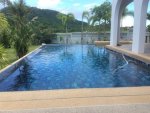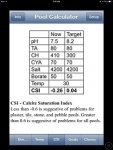Hi,
I am noticing some problems with the grout in my 1 year old pool. My pool is a concrete pool covered entirely in 4" tiles with grout in between.When I rub the grout even with my finger if feels slightly slick and I get quite a bit of white flaky powder coming off the grout. I spent a day scrubbing all the grout lines with a hand brush and it is better now but I'm worried this may be due to an imbalance in my pool chemistry. After I was finished scrubbing it turned the pool cloudy from all the grout residue. I let it settle and vacuumed and the pool was clear again.
My normal CSI runs around -0.3 which I understand shouldn't be corrosive to plaster.
FC 3.8
CC 0
PH 7.5
TA 70
CYA 55
CH 410
Salt 4500
Temp 30c
Borates 50
I am in the process of draining some water to lower the CH to around 350 but when I run the numbers using the pool calculator it shows me I would need a PH of over 8 to maintain a CSI close to zero. Does this seem right?
Also what could be going on with my grout other than corrosion?
Any suggestions or information will be greatly appreciated.
I am noticing some problems with the grout in my 1 year old pool. My pool is a concrete pool covered entirely in 4" tiles with grout in between.When I rub the grout even with my finger if feels slightly slick and I get quite a bit of white flaky powder coming off the grout. I spent a day scrubbing all the grout lines with a hand brush and it is better now but I'm worried this may be due to an imbalance in my pool chemistry. After I was finished scrubbing it turned the pool cloudy from all the grout residue. I let it settle and vacuumed and the pool was clear again.
My normal CSI runs around -0.3 which I understand shouldn't be corrosive to plaster.
FC 3.8
CC 0
PH 7.5
TA 70
CYA 55
CH 410
Salt 4500
Temp 30c
Borates 50
I am in the process of draining some water to lower the CH to around 350 but when I run the numbers using the pool calculator it shows me I would need a PH of over 8 to maintain a CSI close to zero. Does this seem right?
Also what could be going on with my grout other than corrosion?
Any suggestions or information will be greatly appreciated.



